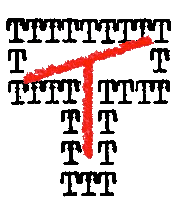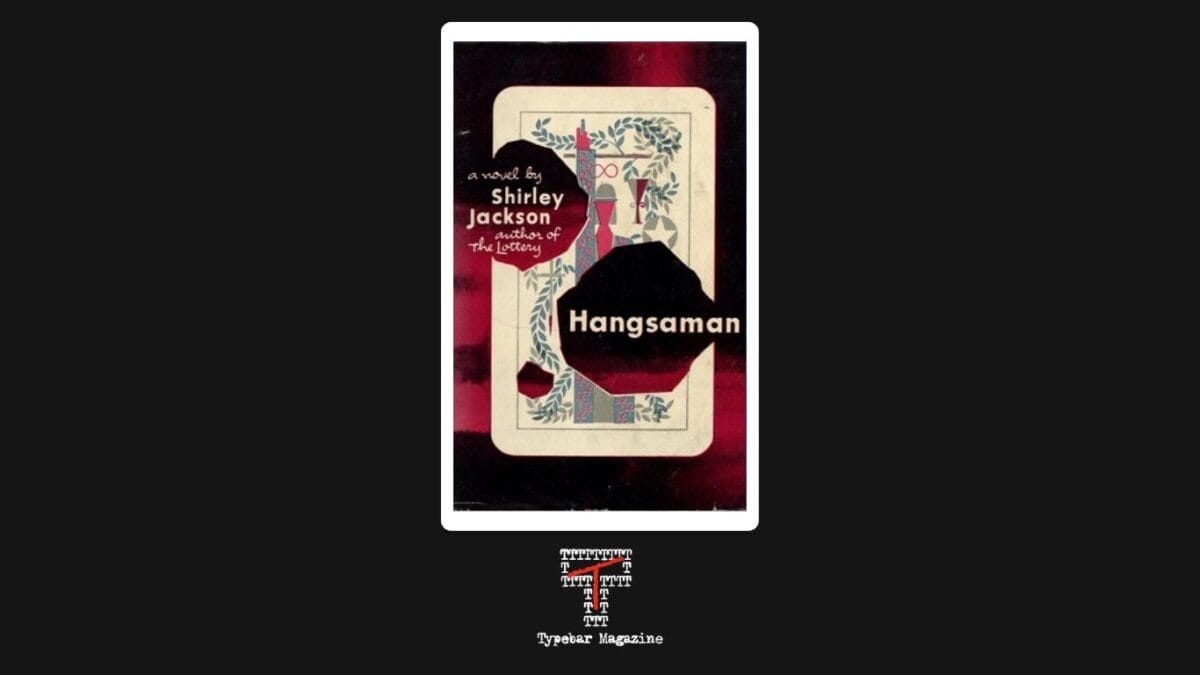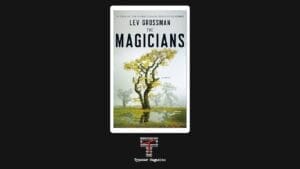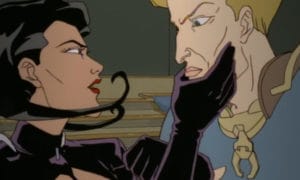By June Martin
Near the end of Hangsaman, a 1951 novel by Shirley Jackson, protagonist Natalie Waite stands on the railing of a bridge and stares down at the water, contemplating jumping and finding death after returning from the culmination of a psychotic episode in the woods. Her moment of suicidal contemplation is interrupted by a man pulling her back to earth, and the urge passes. She looks toward the women’s college, a Bennington analogue where she’s spent the last several months of her life. The final paragraph of the novel reads, “The reassuring bulk of the college buildings showed ahead of her, and she looked fondly up at them and smiled. As she had never been before, she was now alone, and grown-up, and powerful, and not at all afraid.” To take this statement on its face is to enjoy the warmth of a coming-of-age accomplishment, but Shirley Jackson is best known for horror and there is horror to be found here. It lies in the reading that Natalie truly has integrated this self-knowledge, that she has expanded herself, and that even this irrationality and madness was all accounted for in an expansive rationality represented by her father. It is not merely that she fails to escape, or chooses not to escape, but that the only escape available to her was suicide because everything else can be digested by rationality.
On the first page of the novel, Arnold Waite, Natalie’s father, declares, “I am God,” as part of a joke he frequently makes in order to belittle his wife’s belief in God. Shortly after, we are introduced to a weekly ritual that underpins the relationship between Natalie and her father: she submits her writing to him, and he rigorously critiques both her prose and her mode of thinking with all the authority that he possesses as a professional critic and writer of some renown–though with only a single book to his name. He critiques her thoughts and demands total honesty from her, offering her no privacy except for what she calls “the farther places of her mind,” in which she engages in fantasies of travel to strange countries or the interrogation of a detective.
This thematic opposition is set early. The putatively all-knowing and all-critiquing rational mind, declaring itself God as surely as William Blake’s Urizen against fantasy, the unreal, the irrational. It is represented most purely in her father; the other major male character in the book is the English professor Arthur Langdon, who is evaluated by Waite in the following letter he writes to Natalie:
“I should, if I were you, be very careful with Arthur Langdon; I have been re-reading his poems. He is a spiritual man, and one to whom things of the spirit are meaningful. Past a certain point this sort of person is not trustworthy; he will expect more of your compliance than you are ready to give; your humor will offend his mysticism. Do not under any circumstances allow Arthur Langdon to convert you to any philosophical viewpoint until you have first consulted me.
“As the person who knows you most dearly, and who loves you always the best, I am equally the one most capable of telling you these things. It has been my plan, Natalie, all of it, and when you approach despair remember that even your despair is part of my plan.”
This plan, as he calls it, will figure heavily in the horrific implications of the ending of the novel, but first it’s worth thinking about what it means that he opposes himself to spirituality in this moment.
Rationality, as a mode of thought, is not exclusively the refuge of our age’s coterie of online misogynists, who crow about their superiority to emotional women and indifference to feelings. It is the belief in an orderly world, in a cause that reliably proceeds effect. Most of all, it is the belief in a This is a vision of a fundamentally explicable world, where people reliably behave according to their self-interest and the scientific method grinds mystery after mystery into dust and even the unexplained loses the air of mysticism; nothing is beyond understanding, everything unknown is simply yet to be understood.
This is represented in the novel in the man’s world, where even in the women’s college much of the thought and social maneuvering is centered around one’s position relative to the men of power—even the weak father substitute Arthur Langdon has young girls conspiring to break up his marriage with a girl who was once one of those same students. Natalie finds herself disliked, relegated to a marginal social position within this system, and finds no particular reason to persevere.
Only in meeting a girl named Tony does Natalie find something different. It is a close and codependent relationship in which each of them seems to be neglecting their schoolwork and lives outside of each other. In Tony, Natalie seems to have found a creative relationship exactly opposite to that of her father: they play thought games, collaboratively constructing fictional scenarios out of the people and places around them, respond on command to certain prompts, and walk through the world laughing together. However, Tony is easily read as a figment of Natalie’s imagination, a manifestation of a psyche fractured enough to imagine enemies watching and conspiring against her.
The usage of this relationship within the break from reality is no accident, she finds this relationship in insanity because it is insanity that most fully represents opposition to rational order. It ends with Tony dragging Natalie out to a field in the woods at night, far from the college, in some obscure ritual from which Natalie senses there will be no return, symbolizing the permanent departure from sanity. When Natalie turns away from this and flees the woods, Tony lets her go and does not appear in the remainder of the novel.
Her return to campus brings her to the railing of the bridge, contemplating suicide. She’s pulled down by a man, who leaves without being identified, though she suspects it may be the one-armed man she encountered while in the throes of insanity. One could read this as masculine rationality denying her the agency of her own death, but either way it brings Natalie to a moment of reconciliation, in which she digests her brief insanity and suicidality as self-knowledge and faces the college once more.
One could read this as reclamation by rationality. The man pulls her down, her escape fails, and she is condemned to find her place within this system of men, and the self-knowledge attained in this final moment will be cold comfort.
Another reading is that by having achieved an understanding of the world outside this system, she’ll be able to exist within it without having her life entirely dictated by it. In this reading the integration of self-knowledge is the pivotal moment of her life, as befits the ending of a coming-of-age novel.
The above interpretations are pessimistic and optimistic readings respectively, but neither really captures the kind of horror that Shirley Jackson is known for, that sense of a reading a story in which nothing terribly strange or unnatural is happening and experiencing a rising unease like listening to the string of a violin being wound tighter and tighter.
During a visit home, which we later learn has come after she’s already started skipping classes and breaking from reality, her father says:
“I should hate to deprive you prematurely of the suicidal frame of mind, since I am fairly certain that depriving yourself of the ability to feel this way would be more cruel than any sort of physical torture you might inflict upon yourself.”
This merits close examination. The use of “prematurely” indicates Arnold’s belief that there is value that can be drawn from such a frame of mind, and indeed that the value is so high as to outweigh the possibility of “physical torture.” The usage of “fairly certain” is also instructive here, and differentiates the type of rationality represented by Arnold from the rigid, close-minded system that ignores and diminishes everything that doesn’t follow its strict rules. It is a confidence that the rough effect of something is predictable, if not certain, and that loosely or fuzzily-known facts can be incorporated into ordered thinking, specifically in this case into the plan that Arnold has for his daughter.
With that in mind, we can see this moment of self-knowledge achieved on the bridge represents not an escape or failure of escape from such a system of rationality, but the absolute impossibility of her escape from a system of rationality that incorporates the existence of insanity and of non-rational modes of thought into itself and allows for the unpredictability of their outcomes, proceeding undaunted in the intended direction. In this reading there is no hope for Natalie to be anything other than what her father intended her to be, because once she was entered into the system the outcomes were narrowed such that any course of action would achieve the rough desired effect. He is, in effect, God, and every decision Natalie makes only brings her a step closer to her predestined fate.
With one exception, of course. If she had jumped off the bridge, she would have ceased to be and so she wouldn’t have been what her father intended for her to become. Suicide is the ultimate refusal, the one irrefutable argument, but it doesn’t solve the fundamental problem: for her to be alive is to be trapped, and when she believes that she has achieved this self-actualization after her suicide attempt, believing herself to have escaped the trap, the larger one enclosing it snapped shut.
This is the horror of Hangsaman. The tragedy of believing herself free when freedom was never possible, the irony of believing herself powerful when she is powerless, and the belief that she is finally alone, when instead her father is as omnipresent as God, and has succeeded in reaching the farther places of her mind.





